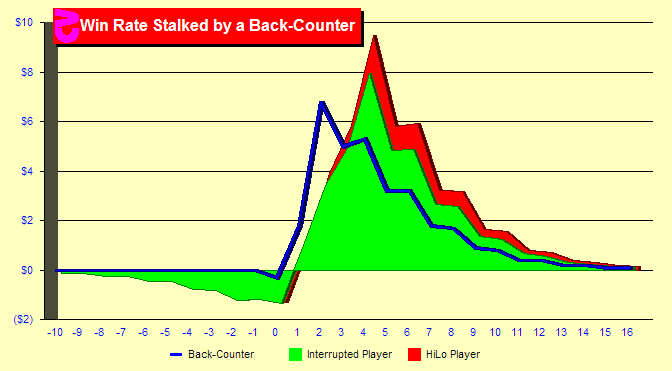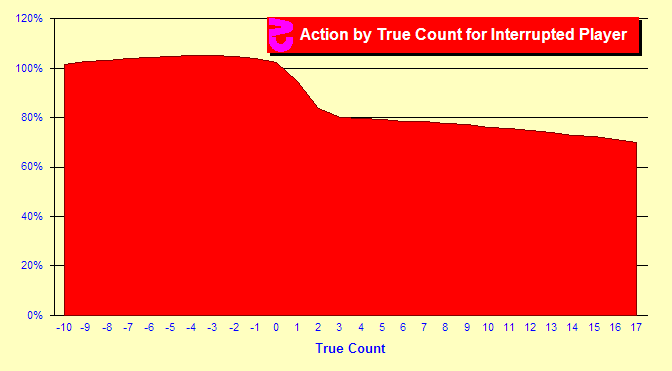|
|
Chapter 10. Effects on Other Players
| We have all heard it — "You took the dealer's bust card."
But in fact, one player can have an effect on another. Some
such effects as well as myths are examined in this chapter. The Shuffle
Tracking chapter discusses the subject further.
"Paranoia is just reality on a finer scale." —
James Cameron, 1995
| |
 How
does back-counting affect others? How
does back-counting affect others?
Backcounting or wonging — playing only good counts —
is clearly a method of improving card counting advantage. But, what
happens when someone else backcounts your table? There are two sims
behind this chart. The first sim consisted of two players. A basic
strategy player in seat one and a Hi-Lo card counter in seat two.
The second sim was the same, but a third player sat down at a true
count of +2 and left at a true count of -1. We are interested in
the effect on the Hi-Lo player in seat two. This chart displays
the win rate by true count for the seat two Hi-Lo player in each
sim plus the backcounter. The red area displays the win rate for
each TC for the Hi-Lo player at the first table. The green area
shows the win rate for the same player, only at a table where a
backcounter comes and goes. The blue ribbon is the win rate of the
backcounter. We can see that at the higher counts, where we win
money, the interrupted player's winnings are reduced. The backcounter
is stealing some of his good cards. Overall, the Hi-Lo player's
edge drops from 1.37% to 1.23% when the backcounter appears at the
table.
The Blackjack basic strategy player is not charted here but is
also impacted. For the basic strategy player, the house edge increased
from .38% to .42%.
|
 Where
did the lost winnings go? Where
did the lost winnings go?
We have seen that the frequency of positive true counts that you
experience will decrease when a back-counter is present. This chart
details that effect. At the negative counts, the Hi-Lo player plays
about the same number of hands whether or not a backcounter is present.
But when the counter is haunting the table, only 75%-80% as many
high true counts are enjoyed. This is due to the backcounter eating
cards in positive true count conditions.
There is also a further impact if the Hi-Lo player is using betting
camouflage. With cover betting, at positive TC's the drop-off in
units bet is more severe than the drop-off in hands played. That
is, the average bet will be lower at high TC's. Why is this? Since
the backcounter's interference tends to reduce the length of high
TC consecutive hands, and reduces the number of hands dealt per
shoe in favorable situations, the Hi-Lo player has fewer opportunities
to win enough hands in a row to pump his bet up to the optimum level
if constrained by cover betting rules.
These charts indicate that a card counter should probably leave
if someone is backcounting his/her table. On the other hand, a basic
strategy player that realizes the situation can increase his/her
bet whenever a backcounter sits down and will end up improving his/her
advantage.
|
Sim details
- Six decks, 5/6 penetration, S17, DAS, LS, 2 players, Basic Strategy
and Hi-Lo, Sweet 16
- Six decks, 5/6 penetration, S17, DAS, LS, 3 players, Basic Strategy
and Hi-Lo and Hi-Lo back-counter in at +2 out at -1, re-enter, Sweet
16
- Five billion rounds
|
|
|
 How
does back-counting affect others?
How
does back-counting affect others? Where
did the lost winnings go?
Where
did the lost winnings go?